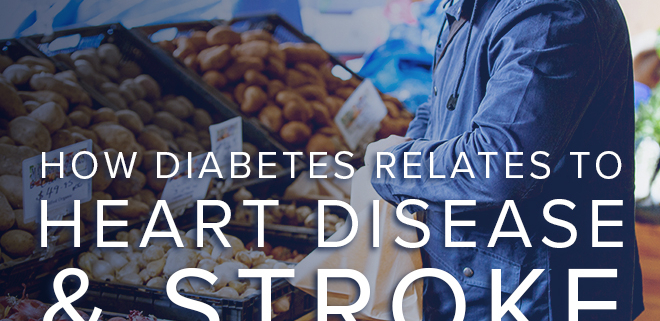Being diagnosed with diabetes usually means you have to watch your blood sugar, mainly through diet, exercise, and medication. However, diabetes can cause a variety of complications throughout the entire body—but how?
The answer is the circulatory system.
The circulatory system is responsible for the transportation of blood throughout the body, providing nutrients and oxygen to cells, as well as transporting waste and carbon dioxide away from them. When the body begins producing and retaining too much glucose (blood sugar), the substance is not isolated to one sector of the body. The circulatory system pushes and pulls the glucose throughout the entirety of the body via the blood. The excessive amounts of sugar cause damage to blood vessels and the organs that are associated with those vessels suffer the consequences.
Diabetes and Heart Disease
One of the organs that most severely feels the effects of diabetes is the heart. Simply being diagnosed with diabetes dramatically raises a patient’s chances of encountering heart disease. The chances of getting heart disease at a younger age than most, as well as the severity of the heart disease itself, are increased when diabetes enters a patient’s life.
As the vessels supplying blood to the heart become damaged, clogged, or hardened by the high presence of glucose, the heart’s ability to receive (and therefore send out) blood is negatively affected. Types of heart disease that are specific to diabetes are Coronary Heart Disease (a buildup of a substance called “plaque” in the arteries), Heart Failure (when the heart is unable to pump the necessary amount of blood), and Diabetic Cardiomyopathy (a disease that damages the actual function and structure of the heart).
Diabetes and Stroke
Another major organ that suffers damage from diabetes is the brain. The brain thrives on oxygen-rich blood in order to function, and when the blood vessels that provide the blood are affected by excessive glucose, very serious complications can occur. When a vessel responsible for providing blood to the brain closes off or bursts, that part of the brain will become oxygen-deprived, and the cells will die. This can result in speech impairments, vision problems, and mobility issues, including paralysis. Like heart disease, being diagnosed with diabetes can significantly raise your chances of stroke.
We know the struggles that patients encounter as they work to regain lost abilities, and our goal is to help those patients overcome them. We feel it is also our responsibility, however, to educate our community about the causes of these conditions, in the hopes of preventing them.
We will continue to explore the topic of diabetes and circulation in our next post, as we learn about lifestyle changes and management techniques that may help patients cope with (and even prevent) these complications.
Sources:
http://www.diabetes.co.uk/body/circulatory-system.html
http://www.diabetes.org/living-with-diabetes/complications/heart-disease/
http://diabetes.niddk.nih.gov/dm/pubs/stroke/
http://www.nhlbi.nih.gov/health/health-topics/topics/dhd


